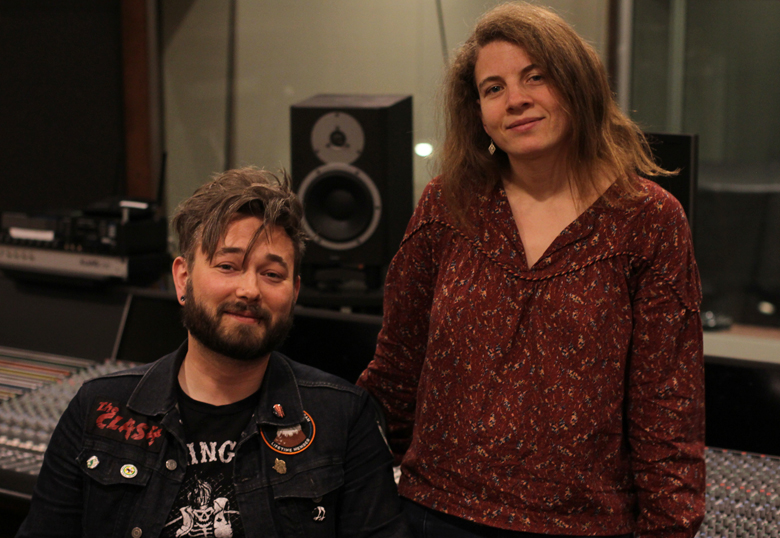A solo musician, supporting guitar and banjo player for Leeroy Stagger, and former front-man of Sophomore Jakes, Ryland Chambers-Moranz is no stranger to a recording studio. At the end of May he hit the road for the first of his summer tour dates, supporting Leeroy Stagger at 17 shows across BC, Alberta and Saskatchewan. When he returns, he’ll start a different kind of musical tour visiting recording studios across Alberta to continue his applied research in digital audio arts.

“As a touring musician I spend most of my time trying to get better at what I do by rehearsing and playing, but it also comes in expanding my horizons and seeking a greater understanding of things I’m not immersed in,” says Chambers-Moranz. “I’d made a few records in my first ten or so years in the music scene and realized I wanted to go deeper into becoming an audio engineer and it would be a great career for me that would accompany my touring life and provide opportunity to work when I wasn’t on the road.”
Entering the Bachelor of Music – Digital Audio Arts (DAA) program at the University of Lethbridge, Chambers-Moranz began studying and researching alongside Dr. Amandine Pras, looking at the practices of the 21st century recording studio, analyzing the differences and preferences of analog versus digital technologies. With the hopes of expanding on an applied research project, Chambers-Moranz applied for and successfully received two prestigious undergraduate research grants: the 2019 Joyce & Ron Sakamoto Research Prize in DAA, and the Chinook Summer Research Award from the Office of Research and Innovation Services.
“The focus of this research will be to expand an experiment on the topic of mixing practices and perception,” explains Chambers-Moranz. “In particular, whether or not there is evidence of any perceptual differences between analog and digital summing of the same mix, and if so, what are they, and is there a correlation between preference and genre?”
Audio production practitioners continue to debate the superiority of analog versus digital technologies, often influenced by preferred musical genre, cultural background, personal taste, age and nostalgia. This study will serve to develop further understanding of these differences, provide insight into the advancements of digital audio technology and will show to what extent analog technology can remain relevant in an increasingly digital world.
“The project will also aid in the distinction between preferred musical genre and production approach,” continues Chambers-Moranz. “If a correlation is found between musical style and production method, it will allow producers and engineers to choose the best mixing format.”
The grant funding provides the opportunity to expand the reach of the study beyond the uLethbridge campus in both mixing capability and in the capacity to draw from a larger sample population. The initial study was completed in uLethbridge’s Studio 1 using the SSL Duality to create mixes, and trained listening participants were drawn from the student body.
“The new funding provides access to vintage analog gear from the Banff Centre and the National Music Centre in Calgary,” says Chambers-Moranz. “I'll also be able to reach a larger demographic of mixing engineers worldwide through my own contacts and through those of my colleagues.”
Working as a research assistant on Dr. Pras’s Social Sciences and Humanities Research Council funded study, “Practices and social aspects of the 21st recording studio,” Chambers-Moranz’s research closely aligns with her own study, building on existing research in the academic community. Pras’s international study investigates how upcoming generations practice the recording studio from anthropological, music aesthetics, music education and sound engineering perspectives.
“My research expands on Paul Alkhallaf’s Master thesis, supervised by Dr. Pras at the Paris Conservatoire, on the perception of analog and digital summing by looking more deeply at analog versus digital mixing practices and perception. It also enhances her exploration of the development of the modern recording studio in the advent of the digital age and the huge surge of home recording studios,” explains Chambers-Moranz. “As the analog and digital question is one touted one way or another by the engineering community there's a lot to unpack in regards to engineer preference and what is becoming our societal norm.”
Throughout the project Dr. Pras will work closely with Chambers-Moranz as a supervisor and colleague.
“During the research project I will fully supervise the replication process as it takes two people and it involves many technical and methodological challenges,” says Pras. She’ll also connect him to industry experts, head engineers and studio technicians in Western Canada and beyond. Pras’s research also looks at cultural mixing practices around the world. Tagging onto the work Pras is already immersed in, the participants involved can be drawn from an international sample providing beneficial contributions to both Pras’ and Chambers-Moranz’s research.
“Coming to the U of L was an easy choice,” says Chambers-Moranz in closing. “It’s a great school with a world class studio, which also offers a broad musical experience, which is just what I was looking for. Ultimately my hope was that working in music in my real life while attending school would join the two in one symbiotic learning experience. I can confidently say that the simultaneous learning on the job, coupled with institutional learning greatly benefit one another.”
The Chinook Summer Research Award will support Chambers-Moranz work until the end of August, and the Joyce & Ron Sakamoto Prize for Research & Development in DAA will continue to support the project until its completion in April 2020. Chambers-Moranz will present the data and findings at the symposium “Social Distinction of the 21st recording studio” with Dr. Pras and Athena Elafros (Sociology) February 14, 2020 as part of Celebrating Connection: A SSHRC Exchange Series.
In the meantime, follow Chambers-Moranz on tour by visiting leeroystagger.com/tour. For more information about the Digital Audio Arts program visit: ulethbridge.ca/future-student
